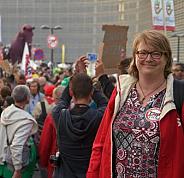Netherlands must reject trade treaty with Canada
Netherlands must reject trade treaty with Canada
When the city of Hamburg decided to introduce stricter environmental regulations in order to protect, amongst other things, access to drinking water, energy giant Vattenfall registered a protest. The company demanded a cool €1.4 billion, because it perceived the reform as a threat to potential future profits. The case was in the end hastily settled and Hamburg came away with nothing worse than a scare, but the city did readjust its environmental regulations. As a result, the German government was in its turn subject to a legal complaint from the European Commission, on the grounds that the country no longer fulfilled the requirements of the EU Habitats Directive. This is just one of countless examples of investors from outside the country in question claiming enormous damages for the simple reason that a decision, taken democratically, has put downward pressure on its expected profits. Even when this does not lead to an verdict favourable to the plaintiff, it sometimes manages to seriously undermine democracy.
 The fact that investors might want to have their interests examined by a court is understandable, and that a country offers this possibility is a hallmark of a healthy democracy and state of law. But that democratic decisions can be overturned by informal panels of arbiters who don't conform to the strictest legal standards, operate behind closed doors and aren't obliged to measure their judgments against national laws or international treaties, that is alarming and incomprehensible.
The fact that investors might want to have their interests examined by a court is understandable, and that a country offers this possibility is a hallmark of a healthy democracy and state of law. But that democratic decisions can be overturned by informal panels of arbiters who don't conform to the strictest legal standards, operate behind closed doors and aren't obliged to measure their judgments against national laws or international treaties, that is alarming and incomprehensible.
It's hardly surprising that there is a great deal of resistance to the arbitrage panels which make such claims possible, and to the system of Investor-State Dispute Settlement or ISDS. People in various European countries have done all in their power to resist this instrument: via a European Citizens' Initiative, in demonstrations which in total have brought millions out on to the streets, and in the Netherlands through a petition for a consultative referendum. A system that privileges multinationals which, at the expense of people, animals and the environment, are looking to safeguard their profits by evading democracy, is an example of something of which people are thoroughly fed up.
 On April 30 the European Court of Justice (ECJ) will pronounce judgment on the question of whether the arbitrage paragraph in treaties such as the Comprehensive Economic and Trade Agreement (CETA) with Canada, CETA, actually conforms to European law. It's difficult to imagine that the ECJ will approve it as a judicial process parallel to its own jurisdiction. The first signals from the Court are, however, not encouraging, and it's to be hoped that its definitive verdict will not be what now seems likely. But even if that turns out not to be the case, the Dutch Parliament can decide to reject CETA, as it should.
On April 30 the European Court of Justice (ECJ) will pronounce judgment on the question of whether the arbitrage paragraph in treaties such as the Comprehensive Economic and Trade Agreement (CETA) with Canada, CETA, actually conforms to European law. It's difficult to imagine that the ECJ will approve it as a judicial process parallel to its own jurisdiction. The first signals from the Court are, however, not encouraging, and it's to be hoped that its definitive verdict will not be what now seems likely. But even if that turns out not to be the case, the Dutch Parliament can decide to reject CETA, as it should.
This trade treaty with Canada was talked up as a stimulus for the economy and for job creation. These claims have since been discredited on numerous different occasions. But the actual reason why multinationals are pressing for such far-reaching treaties is because they want to see more radical deregulation. In relation to this, arbitrage is an important instrument which enables investors to put governments under pressure regarding, for example, the labour market or environmental protection. More fundamental still is the step from this sort of treaty to a so-called 'living treaty', via which the rules of the game can be changed while the match is being played. To that end a permanent backroom is being established in which businesses can from the word go discuss the rules to which they must conform.
The consultative referendum has regrettably enough recently been abolished in the Netherlands, but 200,000 people have signed up to a demand to be allowed to express their views on CETA, well beyond the first threshold of 10,000 signatures, which under the system abolished last year was enough to have the proclamation of a law temporarily suspended. The Dutch Parliament would therefore do well to take note of this signal, thus protecting democracy, the rule of law and our environmental standards. Reintroducing the right to a referendum would be a good start, but even without that a 'no' to CETA would be most appropriate.
Later in the day, following the European Court of Justice declaration that the arbitrage system did indeed conform to European law, Arnout Hoekstra added the following comment:
“A special system of law has now been rigged up for multinationals. No independent judge will look into who is right in a conflict between a multinational and a country. Instead it will be a shadowy group in a back room. This means for instance that the Netherlands could soon have to pay billions in compensation to multinationals because we have stricter rules on food safety than does Canada.”
“Our national Parliament is shortly going to vote on the CETA. 200,000 people have already signed a petition against this treaty. With this treaty we are once again giving up control, while multinationals get more power over our food safety and our environment. I'm calling on Parliament not to turn a blind eye to this, but to vote against the treaty.”
Anne-Marie Mineur is currently a Member of the European Parliament for the SP but will stand down after the election, which is on 23rd May. Arnout Hoekstra is No 1 on the SP's list for that election
- See also:
- Europe
- European Elections 2019
